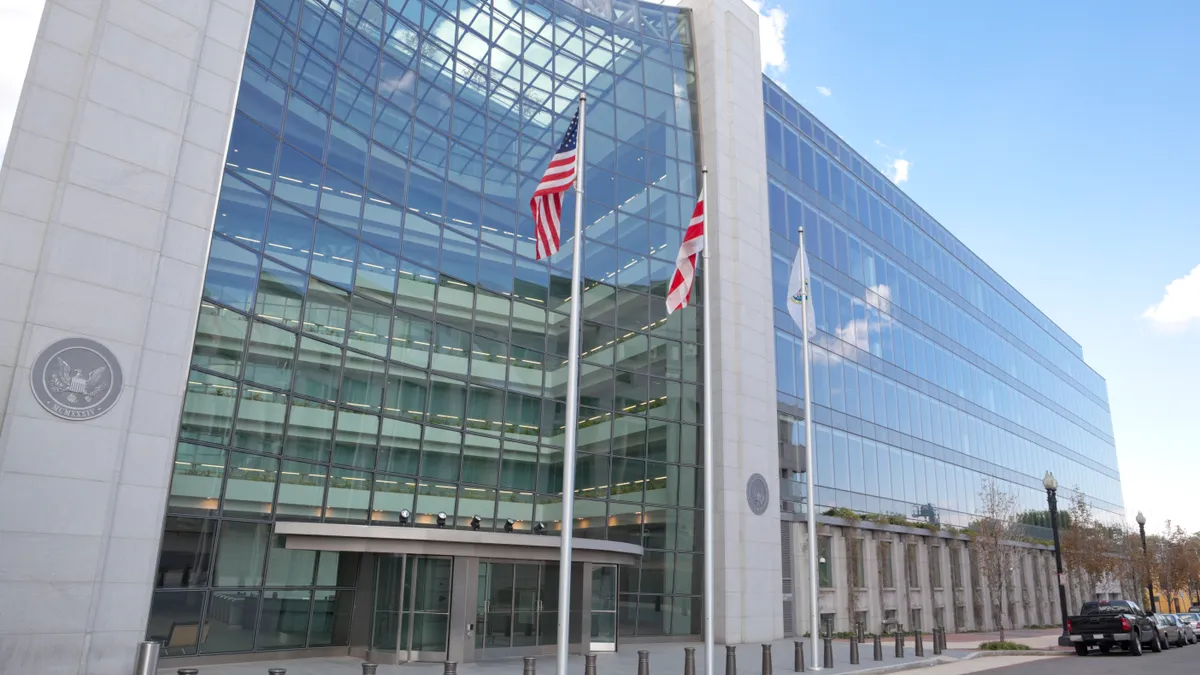Dive Brief:
- The Securities and Exchange Commission (SEC) called on companies to fully disclose crypto asset risks, citing “financial distress” and joining efforts by lawmakers, investors and creditors to gauge the losses and market vulnerabilities following the collapse last month of crypto exchange FTX.
- “Companies should evaluate their disclosures with a view towards providing investors with specific, tailored disclosure about market events and conditions, the company’s situation in relation to those events and conditions, and the impact on investors,” the SEC’s Corporation Finance Division said Thursday.
- The FTX bankruptcy has jarred scores of creditors, prompting the SEC to partly focus its guidance on risks at public companies related to dealings with crypto-market participants. The agency requires companies to disclose direct or indirect exposure to counterparties that filed for bankruptcy, are deemed to be insolvent, suffered excessive redemptions or failed to account for their customers’ crypto assets.
Dive Insight:
Since the implosion of FTX, the SEC and other regulators have come under fire from lawmakers for lagging behind rapid growth in crypto markets.
“The SEC has brought some enforcement actions related to fraudulent and unregistered crypto offerings over the past few years, but it has fallen far behind as the crypto industry has drawn in millions of new investors,” Sen. Elizabeth Warren, D-Mass., said after the failure of FTX.
“The Securities and Exchange Commission needs to suit up” and fight fraud, she said. “The longstanding legal test defining securities gives the agency the power — but power is worthless if the cop on the beat won’t use it.”
SEC Chair Gary Gensler on Wednesday rebuffed the criticism. “We’re already suited up,” Gensler said in an interview with Yahoo Finance.
“We have a robust enforcement history in the crypto space — I think over 100 actions — a couple of dozen while I’ve been here as chair against crypto exchanges, against crypto lending platforms, against, of course, tokens,” Gensler said, citing moves against BlockFi, Poloniex and Coinbase, the largest U.S. crypto exchange.
“Unfortunately for the investing public, the entrepreneurs in this field have chosen — and it’s a choice — they’ve chosen to try to skirt the law,” he said.
Advocates of cryptocurrency say that CFOs can use blockchain technology to gain access to fresh pools of capital, serve new groups of customers who transact in cryptocurrencies and streamline Treasury functions such as money transfers.
Some CFOs have adopted crypto-enabled payments or, in the high-profile examples of Tesla and MicroStrategy, brought cryptocurrencies onto their balance sheets. They helped push up the value of non-state digital assets to a total market capitalization of $3 trillion in November 2021 from $14 billion in 2016, the White House said, citing unidentified surveys.
Yet cryptocurrencies and related markets have proven extremely volatile this year. Shares in Coinbase have plunged more than 82%, while bitcoin and ethereum have plummeted more than 63% and 65%, respectively.
Gensler has repeatedly compared the crypto market to “the Wild West.” Under guidance that took effect in April, the SEC said companies should disclose the risks to investors from cryptocurrencies held on behalf of customers and account for the assets as liabilities.
Gensler in May announced plans to expand the SEC’s Cyber Unit to 50 enforcers from 30, adding investigative staff attorneys, trial counsels and fraud analysts and renaming it as the Crypto Assets and Cyber Unit.
The stepped-up enforcement team focuses on investigating violations in securities law related to crypto asset offerings, exchanges and lending, as well as nonfungible tokens, stablecoins and DeFi platforms, the SEC said.
Since its creation in 2017, the cyber unit has imposed penalties exceeding $2 billion against companies involved in crypto assets, the agency said.
“Recent bankruptcies and financial distress among crypto asset market participants have caused widespread disruption in those markets,” the SEC said in its newest guidance.
The agency underscored “the need for clear disclosure about the material impacts of crypto asset market developments, which may include a company’s exposure to counterparties and other market participants; risks related to a company’s liquidity and ability to obtain financing; and risks related to legal proceedings, investigations, or regulatory impacts in the crypto asset markets.”













